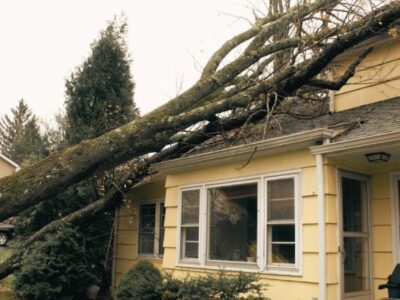A Tree Falls and Causes Damage to Persons and Property—Who is Liable?
May 19, 2021
by Lindsey Casey Franklin
When a tree or limb falls and causes damage to property or persons, who is liable for the damages? The answer under Georgia law can be complicated, but generally depends on the answers to three questions:
1. Who owns the tree?
In Georgia, ownership is based on where the trunk of the tree is located. The landowner with the trunk of the tree on his or her property is deemed the owner of the tree. In fact, even if the tree’s limbs overhang onto a neighbor’s property, the tree belongs to you if the tree trunk is on your property.
A tree trunk that is situated on the property line between the two properties is equally owned by both property owners. Both property owners hold an interest in the tree; therefore, both owners are responsible for its care and maintenance.
2. Why did the tree fall?
First, it is possible that the tree fell due to an “Act of God” occurrence such as a storm. This occurrence is viewed as being outside of a homeowner’s ability to predict or prepare for damage from these natural events, which means that the property owner would not be liable for either property damage or injuries. However, responsibility for cleanup of the tree under these circumstances will likely fall on the owner of the property where the tree debris landed.
Alternatively, liability may be imposed on a tree’s owner if the tree is dead or diseased. Georgia’s fallen tree responsibility law uses the “visibly dead or diseased” rule for falling trees. Georgia law is clear that when a tree that falls and damages a neighbor’s property or injures another individual, and evidence exists that the tree was dead or diseased prior to the fall, then the tree owner is liable for damages that resulted from the accident. A landowner that knows that a tree is decayed and may fall and damage the property of an adjoining landowner has a duty to eliminate the danger. Conversely, a tree that does not display signs of death and disease may not impose liability for causing damage to a neighbor’s property.
3. Did the tree owner know or should have known that the tree was unsafe?
After identifying the owner of the tree and the cause of the tree’s fall, the next question in determining liability is whether the owner knew or should have known that the tree posed safety issues. The answer to this question may turn on whether you live in a rural or urban location.
In rural areas, there is lesser liability for a landowner whose tree falls onto neighboring property unless that landowner was put on notice that the tree posed a danger to the adjacent property. Georgia Courts do not require you to inspect your property to make sure that each and every tree is safe. However, if a rural landowner has actual notice that a particular tree poses a danger to a neighbor or to the public, the landowner must act to cure the danger.
On the other hand, urban areas such as those properties within a community association, treat tree damage much differently than tree damage in rural areas because trees in urban areas pose more danger to persons and property. If you live in an urban area, Georgia Courts require you to regularly inspect trees on your property that could: (1) Fall over the property line; or (2) Injure people or property that come on to your property. The inspection is limited to trees that are visibly decayed to the point that factors such as wind would pose a significant threat of damage or injury.
Regardless of whether you reside in a rural or urban area, however, be aware that if a tree’s owner is put on notice of a potentially dangerous tree and fails to take reasonable steps to remedy the dangerous tree, then the owner will be responsible for all harms caused by the falling tree. Note that there is no general duty to constantly check all trees for non-visible rot, nor is there a requirement that a professional conduct the inspection. In fact, Georgia law does not obligate property owners to obtain professional opinions about the health of their trees. Nevertheless, if you are concerned about the health of a particular tree on your property, an arborist can professionally assess the health of the tree so that you can take steps as necessary to safeguard you against potential liability.
Lindsey C. Franklin is an associate attorney with Flint, Connolly & Walker, LLP currently representing clients on various civil matters. If you seek legal advice pertaining to tree liability, she and the other attorneys at Flint, Connolly & Walker, LLP have the knowledge and expertise to help you.

